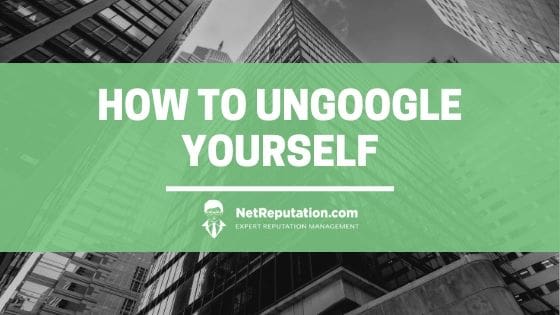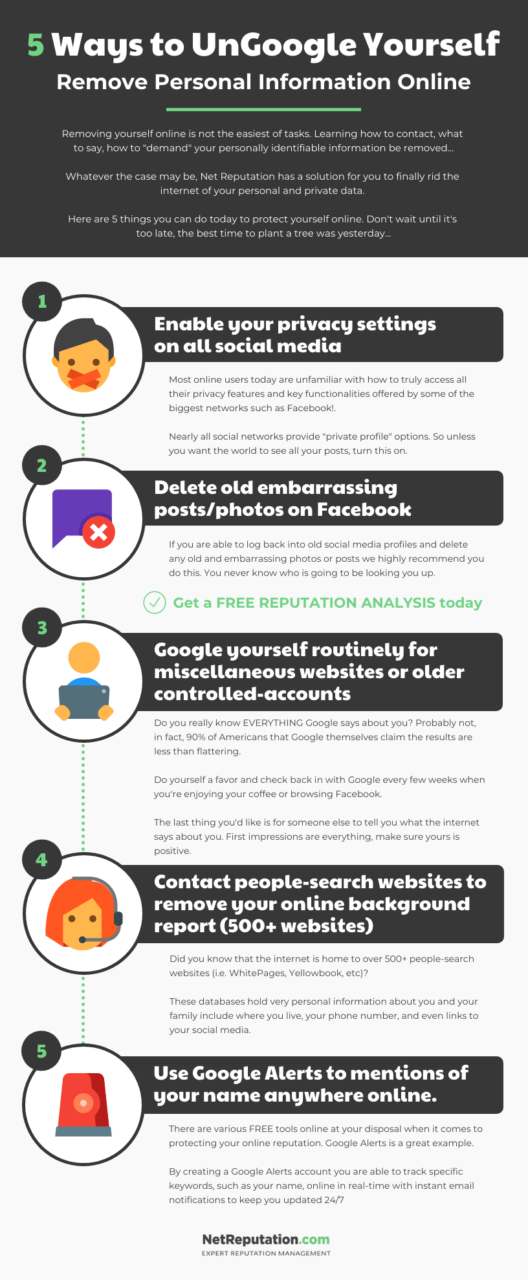Want to disappear from Google? Contact a Reputation Specialist at 844-461-3632 to learn how to unGoogle yourself fast.
Whether you know it or not, your personal data and private information are online.
And anyone with internet access can find your home address, email, phone numbers, and work history in just minutes.
What’s worse: social sites and people search websites make it easy to locate and share your personal data with the world.
So, what can you do to scrub your name off the internet? How do you clear the web of negative or unwanted blogs, articles, social comments, and more?
The internet is a great resource of information. But if not handled well, it can cause a lot of harm to your reputation, safety, and bottom line. Your online accounts are a window into your reputation; negative information can impact your ability to leverage employment opportunities, rent a house, or build your business.
Below, we dive into how to remove yourself from Google results once and for all.
Request a Free Consultation
How to Remove Yourself from Google Search
When it comes to removing your personal information online and how to unGoogle yourself, where do you start?
With the help of NetReputation, your solution starts with a complete analysis of your individual data online. We comb through thousands of sites to ensure we every mention of your name on the web. Our team of experts analyzes a wide range of online resources, including:
- Google search results
- Data broker sites
- Other search engine results (Yahoo, Bing!, and more)
- Social media platforms
- People finder sites
- Personal blog pages
- Indexes published by third parties
- Activity from your email account
People search websites every day for information on others. It is such a common practice that Google searches are conducted at a rate of 63,000 times per second, which adds up to billions of unique searches each year. Your digital footprint may be visible to others, including personal info, public records, Facebook information, and social media profiles. If you don’t take charge of the information available about you that others post online, your privacy is at risk.
Our goal is to deliver all removals on the first try. And for this reason, we take care to build solutions that get the job done right the first time.
We locate every personal data point fast, including each mention of your name, contact info, criminal history, work history, and more found on Google searches and other search results available on the internet. From your social media profiles to the information published by data brokers, family members, and people search sites, our team of professionals conducts a thorough privacy checkup to help you permanently delete identifying information.
Learn how to unGoogle yourself today with a complete removal solution that rids the web of all online mentions. Prevent Google from displaying your public records or other data on the internet, preserving your privacy and eliminating your online presence that can be used by data brokers to share with others.
Note: Google does not pick and choose what it shows on search results ranking pages. Rankings are based on a variety of factors, including popularity, traffic, trust, updated content, and more. A complex algorithm carefully evaluates each factor, then assigns a ranking based on data collection.
Your task when removing yourself from search results is to locate all unwanted info and links online. You start by scanning the first several pages of Google by conducting a quick Google search (we recommend the first five pages). Some of the search results may turn up outdated content, old accounts, and past posts you made on blogs or social media outlets.
Keep a Record of Everything You Want To UnGoogle in Search Engines
Keep a record of all URLs. This provides a quick reference point as you work to erase yourself from Google properties, including every search results page, Google Maps, and more. Maintaining a list allows you to focus on the digital identities that are impacting your hard-earned reputation.
Once you create this list, reach out to each website owner and identify the best removal options available. Contact information will either be listed on the site or found with the WHOIS tool.
Perform a quick Google search to learn who controls the website or newspaper. Most people reach out to the author when they find a bad article. Unfortunately, that’s like criticizing the salesperson when the clerk gives you incorrect change. The site owner is a better person to focus on; he or she may honor requests to opt out of posting or to have data removed. They may even delete comments that reference you, such as comments revealing family members’ names or other identifying information that can damage your reputation.
Send your removal requests to those who control the account or transaction. Your letter should explain why this content is wrong and how it has crippled your business or personal reputation. Document everything you can, as this may be valuable if you have to pursue a legal remedy.
If you can’t provide any proof that the content causes you real harm, you won’t win in a court of law or in the public eye.
How To Ungoogle Yourself on Social Media Accounts
Social media is deemed a self-controlling platform, making these steps fairly straightforward.
[HOW TO UNGOOGLE YOURSELF – INFOGRAPHIC]
If you want to delete yourself from Google or remove your social profiles from Google search, you must first delete your profiles altogether. In simple terms, close every social account. That means no more Facebook, Instagram, and no more social media in general. When you are ready to delete social media, the process is relatively straightforward.
To start, log into each social media account you wish to delete. Afterward, head to your account settings, which are often located in the upper right corner of your screen. Locate the “Deactivate Account” option from the drop down menu, which allows you to halt your profile. Remember that each platform may have a different process to delete or disable your account.
When you remove your social media profile, you will block access to the sites that collect the information you’ve posted to your Instagram or Facebook account.
Updating Google Search Results Post-Removal
Note: Once you remove the desired web page or account from the source, your job is not yet finished.
Once you remove the page, reach out to various support teams to ensure that the page is no longer ranking in search results. (You can do this here)
To speed up the removal process, you can also access Google’s public removal tool. This Google assistant can be a valuable resource when you have removed details from an offending site or have closed an account. Remember that the search engine leader collects a wide range of data on users when you are logged into your Google account, including:
- Account information
- Location history
- Email accounts and activity on every email account
- Family members
- Home address
- Personalized ads targeted to you
- Google Maps activity
You Deserve Online Privacy
The data collection of personal information by search engines is so pervasive that the Electronic Frontier Foundation has filed thousands of legal claims against Google, other search engines, and the government. The EFF has also served as a powerful advocacy voice for privacy protections in the public and private sectors. The group is responsible for spearheading opt-out laws in states across the country.
Everyone deserves privacy online. With the help of NetReputation and the tips for removing information from offending websites, you can take charge of your privacy while protecting your digital reputation.
Related Questions on How To UnGoogle Yourself
What determines whether or not content can be removed?
If a consumer or blogger lists personal belief you don’t like, legal removal is likely not an option.
But if the consumer posts something dubious that blames you for wrongdoing and cripples your business, you can. In addition, you don’t need an attorney.
Most of the time, a strongly worded message to the webmaster is sufficient. While third-party paid service providers offer data removal options, in most cases you can make requests on your own.
It must also be recognized that there exist undeletable accounts. These accounts may require the assistance of a qualified legal professional to close or disable.
How long do you have to unGoogle yourself once the information is out there?
Go after the webmaster(s) right away. The longer the negative content is online, the more time Google has to index the web page.
Google will stop indexing a webpage if it reveals private and/or personal information, such as Social Security numbers, private account details, or other information listed online that is sensitive. However, you need to make a case to Google if it involves other matters.
If you can’t remove the content, what should you do?
There is an added reputation management plan you can use to suppress the article from the first several pages from Google.
You can do this by creating optimized, high-quality content, such as your own blog, articles, posts on social media accounts more. Reputation managers utilize the latest tools and techniques to help you remove information from nearly any site, and can also help you restore the reputation you depend on. You don’t need to be a celebrity or an executive to take advantage of these services; the average person deserves the ability to protect and defend his or her online reputation as well.
If you need help with how to unGoogle yourself, personal and private information removal, or an online crisis, at Net Reputation we are here for you.
Contact our Information Removal Team at 844-461-3632 today to get started.

